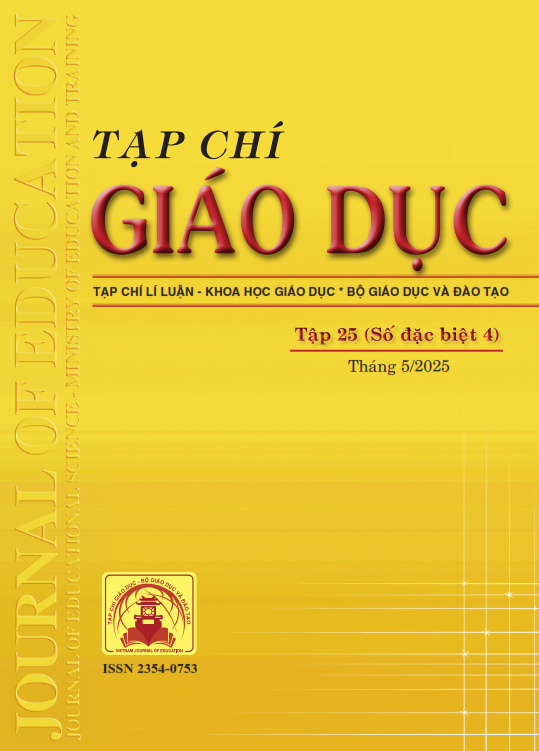Vai trò điều chỉnh của siêu nhận thức trong giải quyết bài toán thực tiễn ở học sinh trung học phổ thông
Tóm tắt
The 2018 Mathematics General Education Curriculum is interested in students' ability to regulate through some specific manifestations and requirements in some mathematic competencies, such as: mathematical thinking and reasoning competency (regulating the way to solve problems and the implementation of solutions in terms of mathematics), mathematical modeling competency . In which, the ability to regulate is one of the important components of metacognition. In this article, we conduct a study on the ability to regulate of high school students in solving real-life problems through the research of Rohdes (2019) and the relationship between metacognition and Guy Brousse’s Situational Theory (1997). The study shows that there are 5 types of regulation. We also conduct an observational study on a group of students to understand more about two of the above types of regulation. The research results are the basis for teachers to propose measures to foster metacognition to improve and enhance students' problem-solving ability.
Tài liệu tham khảo
Bộ GD-ĐT (2018). Chương trình giáo dục phổ thông môn Toán (ban hành kèm theo Thông tư số 32/2018/TT-BGDĐT ngày 26/12/2018 của Bộ trưởng Bộ GD-ĐT).
Brousseau, G. (1997). Theory of didactical situations in mathematics (N. Balacheff, M. Cooper, R. Sutherland, & V. Warfield, Eds. & Trans.). Mathematics Education Library, 19, 86-87.
Brown, A. L. (1987). Metacognition, executive control, self-regulation, and other more mysterious mechanisms. In F. E. Weinert & R. Kluwe (Eds.), Metacognition, motivation, and understanding (pp. 65-116). Lawrence Erlbaum Associates.
Cao Thị Hà, Nguyễn Văn Thanh (2014). Kĩ năng siêu nhận thức - Những vấn đề lí luận và khả năng vận dụng vào quá trình dạy học Toán. Tạp chí Giáo dục, 329, 51-53.
Đỗ Đức Thái (Tổng chủ biên kiêm Chủ biên), Phạm Xuân Chung, Nguyễn Sơn Hà, Nguyễn Thị Phương Loan, Phạm Sỹ Nam, Phạm Minh Phương, Phạm Hoàng Quân (2022). Toán 10 (Tập 1), Bộ Cánh Diều. NXB Đại học Sư phạm.
Efklides, A. (2001). Metacognitive experiences in problem solving: Metacognition, motivation, and self-regulation. In Trends and prospects in motivation research (pp. 297-323). Dordrecht: Springer Netherlands.
Flavell, J. H. (1976). Metacognitive aspects of problem solving. In The nature of intelligence (pp. 231-236). Routledge.
Hoàng Thị Ngà (2017). Nghiên cứu bước đầu về siêu nhận thức và những khả năng ứng dụng trong dạy học. Tạp chí Giáo dục, số đặc biệt kì 3 tháng 8, 147-151.
Lê Bình Dương, Nguyễn Thị Hậu (2020). Dạy học xác suất thống kê theo hướng rèn luyện kĩ năng siêu nhận thức cho sinh viên ở các trường đại học. Tạp chí Giáo dục, 472, 50-54.
Lê Thị Hoài Châu, Claude Comiti (2018). Thuyết nhân học trong Didactic Toán. NXB Đại học Sư phạm Thành phố Hồ Chí Minh.
Nelson, T. O. (1996). Consciousness and metacognition. American Psychologist, 51(2), 102.
Rohdes, S. (2019). How did you solve it? Metacognition in Mathematics. International Society for Technology in Education (ISTE), 15(7).
Teng, F. (2023). Metacognition. Cognitive individual differences in second language acquisition: Theories, assessment, and pedagogy, 175-199.
Tobias, S., & Everson, H. T. (2002). Knowing What You Know and What You Don't: Further Research on Metacognitive Knowledge Monitoring. Research Report No. 2002-3. College Entrance Examination Board.
Trần Nam Dũng (tổng chủ biên), Trần Đức Huyên (chủ biên), Nguyễn Thành Anh, Vũ Như Thư Hương, Ngô Hoàng Long, Phạm Thị Thu Thủy (2022). Toán 10 (Tập 2), Bộ sách Chân trời sáng tạo. NXB Giáo dục Việt Nam.
Đã Xuất bản
Cách trích dẫn
Số
Chuyên mục
Giấy phép

Tác phẩm này được cấp phép theo Ghi nhận tác giả của Creative Commons Giấy phép quốc tế 4.0 .












